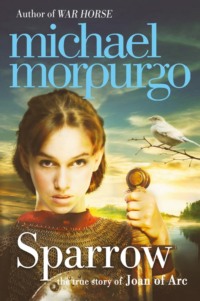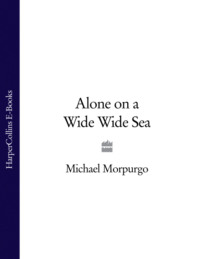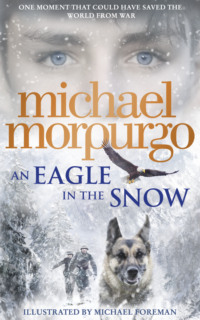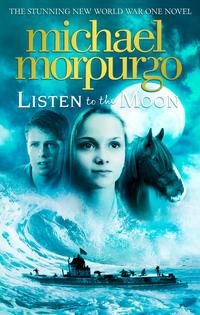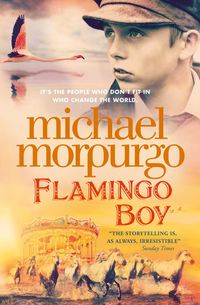
Полная версия
Morpurgo War Stories
Molly and I would keep watch while Charlie set the traps or put out his nets. Lambert, the Colonel’s bailiff, may have been old, but he was clever, and we knew he’d let his dog loose on us if he ever caught us at it. Late one evening, sitting by the bridge with Charlie busy at his nets downstream, Molly took my hand in hers and held it tight. “I don’t like the dark,” she whispered. I had never been so happy.
When the Colonel turned up at the house the next day, we thought it must be either because we’d been found out somehow or because he was going to evict us. It was neither. Grandma Wolf seemed to be expecting him, and that was strange. She went to the door and invited him in. He nodded at Mother and then frowned at us. Grandma Wolf waved us outside as she asked the Colonel to sit down. We tried eavesdropping but Big Joe was no good at keeping quiet, so we had to wait until later to hear the worst. As it turned out, the worst was not the worst at all, but the best.
After the Colonel had gone, Grandma Wolf called us in. I could see she was puffed up with self-importance, aglow with it. “Your mother will explain,” she declared grandly, putting on her bonnet. “I have to get up to the Big House right away. I’ve work to do.”
Mother waited until she’d gone and could not help smiling as she told us, “Well,” she began, “you know some time ago your great aunt used to work as housekeeper up at the Big House?”
“And then she got kicked out by the Colonel’s wife,” said Charlie.
“She lost her job, yes,” Mother went on. “Well, now the Colonel’s wife has passed away it seems the Colonel wants her back as live-in housekeeper. She’ll be moving up to the Big House as soon as possible.”
I didn’t cheer, but I certainly felt like it.
“What about the cottage?” Charlie asked. “Is the old duffer putting us out then?”
“No, dear. We’re staying put,” Mother replied. “He said his wife had liked me and made him promise to look after me if ever anything happened to her. So he’s keeping that promise. Say what you like about the Colonel, he’s a man of his word. I’ve agreed I’ll do all his linen for him and his sewing work. Most of it I can bring home. So we’ll have some money coming in. We’ll manage. Well, are you happy? We’re staying put!”
Then we did cheer and Big Joe cheered too, louder than any of us. So we stayed on in our cottage and Grandma Wolf moved out. We were liberated, and all was right with the world again. For a while at least.
Both of them being older than me, Molly by two years, Charlie by three, they always ran faster than I did. I seem to have spent much of my life watching them racing ahead of me, leaping the high meadow grass, Molly’s plaits whirling about her head, their laughter mingling. When they got too far ahead I sometimes felt they wanted to be without me. I would whine at them then to let them know I was feeling all miserable and abandoned, and they’d wait for me to catch up. Best of all Molly would sometimes come running back and take my hand.
When we weren’t poaching the Colonel’s fish or scrumping his apples — more than anything we all loved the danger of it, I think — we would be roaming wild in the countryside. Molly could shin up a tree like a cat, faster than either of us. Sometimes we’d go down to the river bank and watch the kingfishers flash by, or we’d go swimming in Okement Pool hung all around by willows, where the water was dark and deep and mysterious, and where no one ever came.
I remember the day Molly dared Charlie to take off all his clothes, and to my amazement he did. Then she did, and they ran shrieking and bare-bottomed into the water. When they called me in after them, I wouldn’t do it, not in front of Molly. So I sat and sulked on the bank and watched them splashing and giggling, and all the while I was wishing I had the courage to do what Charlie had done, wishing I was with them. Molly got dressed afterwards behind a bush and told us not to watch. But we did. That was the first time I ever saw a girl with no clothes on. She was very thin and white, and she wrung her plaits out like a wet cloth.
It was several days before they managed to entice me in. Molly stood waist-deep in the river and put her hands over her eyes. “Come on, Tommo,” she cried. “I won’t watch. Promise.” And not wanting to be left out yet again, I stripped off and made a dash for the river, covering myself as I went just in case Molly was watching through her fingers. After I’d done it that first time, it never seemed to bother me again.
Sometimes when we tired of all the frolicking we’d lie and talk in the shallows, letting the river ripple over us. How we talked. Molly told us once that she wanted to die right there and then, that she never wanted tomorrow to come because no tomorrow could ever be as good as today. “I know,” she said, and she sat up in the river then and collected a handful of small pebbles. “I’m going to tell our future. I’ve seen the gypsies do it.” She shook the pebbles around in her cupped hands, closed her eyes and then scattered them out on to the muddy shore. Kneeling over them she spoke very seriously and slowly as if she were reading them. “They say we’ll always be together, the three of us, for ever and ever. They say that as long as we stick together we’ll be lucky and happy.” Then she smiled at us. “And the stones never lie,” she said. “So you’re stuck with me.”
For a year or two Molly’s stones proved right. But then Molly got ill. She wasn’t at school one day. It was the scarlet fever, Mr Munnings told us, and very serious. Charlie and I went up to her cottage that evening after tea with some sweetpeas Mother had picked for her — because they smell sweeter than any flower she knew, she said. We knew we wouldn’t be allowed in to see her because scarlet fever was very catching, but Molly’s mother did not look at all pleased to see us. She always looked grey and grim, but that day she was angry as well. She took the flowers with scarcely a glance at them, and told us it would be better if we didn’t come again. Then Molly’s father appeared from behind her, looking gruff and unkempt, and told us to be off, that we were disturbing Molly’s sleep. As I walked away, all I could think of was how unhappy Molly must be living in that dingy little cottage with a mother and father like that, and how trees fall on the wrong fathers. We stopped at the end of the path and looked up at Molly’s window, hoping she would come and wave at us. When she didn’t we knew she must be really ill.
Charlie and I never said our prayers at all any more, not since Sunday school, but we did now. Kneeling side by side with Big Joe we prayed each night that Molly would not die. Joe sang Oranges and Lemons and we said Amen afterwards. We had our fingers crossed too, just for good measure.

I‘m not sure I ever really believed in God, even in Sunday school. In church I’d gaze up at Jesus hanging on the cross in the stained-glass window, and feel sorry for him because I could see how cruel it was and how much it must be hurting him. I knew he was a good and kind man. But I never really understood why God, who was supposed to be his father, and almighty and powerful, would let them do that to him, would let him suffer so much. I believed then, as I believe now, that crossed fingers and Molly’s stones are every bit as reliable or unreliable as praying to God. I shouldn’t think like that because if there’s no God, then there can be no heaven. Tonight I want very much to believe there’s a heaven, that, as Father said, there is a new life after death, that death is not a full stop, and that we will all see one another again.

It was while Molly was ill in bed with the scarlet fever that Charlie and I discovered that although in one way Molly’s stones had let us down, in another way they had indeed spoken the truth: with her, with the three of us together, we were lucky, and without her we weren’t. Up until now, whenever the three of us had gone out together poaching the Colonel’s fish, we had never been caught. We’d had a few close shaves with old Lambert and his dog, but our lookout system had always worked. Somehow we’d always heard them coming and managed to make ourselves scarce. But the very first time Charlie and I went out poaching without Molly, things went wrong, badly wrong, and it was my fault.
We had chosen a perfect poaching night, not a breath of wind so we could hear anyone coming. With Molly beside me on lookout I’d never felt sleepy, and we’d always heard old Lambert and his dog in plenty of time for Charlie to get out of the river, for us all to make good our escape. But on this particular night my concentration failed me. I’d made myself comfortable, probably too comfortable, in our usual place by the bridge with Charlie netting downstream. But after sitting there for a while I just fell asleep. I don’t drop off all that easily, but when I do sleep I sleep deeply.
The first I knew of anything was a dog snuffling at my neck. Then he was barking in my face, and old Lambert was dragging me to my feet. And there was Charlie way out in the middle of the moonlit river hauling at the nets.
“Peaceful boys! You young rascals,” Lambert growled. “Caught you red-handed. You’re for it now, make no mistake.”
Charlie could have left me there. He could have made a run for it and got clean away, but Charlie’s not like that. He never has been.
At the point of a shotgun Lambert marched us back along the river and up to the Big House, his dog snarling at our heels from time to time just to remind us he was still there, and that he’d eat us alive if we made a run for it. Lambert locked us in the stables and left us. We waited in the darkness, the horses shifting and munching and snorting around us. All too soon we saw the approaching light of a lamp, and heard footsteps and voices. Then the Colonel was there in his slippers and his dressing gown, and he had Grandma Wolf with him in her nightcap looking every bit as fierce as Lambert's dog.
The Colonel looked from one to the other of us, shaking his head in disgust. But Grandma Wolf had the first word. “I’ve never in all my life been so ashamed,” she said. “My own family. You’re nothing but a downright disgrace. And after all the Colonel’s done for us. Common thieves, that’s what you are. Nothing but common thieves.”
When she’d finished it was the Colonel’s turn. “Only one way to deal with young ruffians like you,” he said. “I could have you up before the magistrate, but since I’m the magistrate anyway there’s no need to go to all that trouble, is there? I’ll sentence you right now. You will come up here tomorrow morning at ten o’clock sharp, and I’ll give each of you the hiding you so richly deserve. Then you can stay and clean out the hunt kennels till I say you can go. That should teach you not to come poaching on my land.”
When we got home we had to tell Mother everything we’d done, everything the Colonel had said. Charlie did most of the talking. Mother sat listening in silence, her face stony. When she spoke, she spoke in little more than a whisper. “I can tell you one thing,” she said. “There’ll be no hiding. Over my dead body.” Then she looked up at us, her eyes full of tears. “Why? You said you’d been fishing in the brook. You told me. Oh Charlie, Tommo.” Big Joe stroked her hair. He was anxious and bewildered. She patted his arm. “It’s all right, Joe. I’ll go up there with them tomorrow. Cleaning out the kennels I don’t mind — you deserve that. But it stops there. I won’t let that man lay a finger on you, not one finger, no matter what.”
Mother was as good as her word. How she did it and what was said we never knew, but the next day after Mother and the Colonel had had a meeting in his study, she made us stand in front of him and apologise. Then after a long lecture about trespassing on private property, the Colonel said that he’d changed his mind, that instead of the hiding we would be set to cleaning out the Colonel’s kennels every Saturday and Sunday until Christmas.
As it turned out we didn’t mind at all because, although the smell could be disgusting, the hounds were all around us as we worked, their tails high and waving and happy. So we often stopped work to pet them, after we’d made quite sure no one was looking. We had a particular favourite called Bertha. She was almost pure white with one brown foot and had the most beautiful eyes. She would always stand near us as we scraped and swept, gazing up at us in open adoration. Every time I looked into her eyes I thought of Molly. Like Bertha, she too had eyes the colour of heather honey.
We had to be careful, because Grandma Wolf, now more full of herself than ever, would frequently come out into the stable yard to make sure we were doing our work properly. She’d always have something nasty to say: “Serves you right,” or “That’ll teach you,” or “You should be ashamed of yourselves,” always delivered with a tut and a pained sigh. To finish there’d be some nasty quip about Mother. “Still, with a mother like that, I suppose you’re not entirely to blame, are you?”
Then Christmas Eve came and our punishment was over at last. We said fond farewells to Bertha and ran off home down the Colonel’s drive for the last time, blowing very loud raspberries as we went. Back in the cottage we found waiting for us the best Christmas present we could ever have hoped for. Molly was sitting there smiling at us as we came in through the door. She was pale, but she was back with us. We were together again. Her hair was cut shorter. The plaits were gone, and somehow that changed the whole look of her. She wasn’t a girl any more. She had a different beauty now, a beauty that at once stirred in me a new and deeper love.
I think, without knowing it, I had always charted my own growing up by constant comparison to Molly and Charlie. Day by day I was becoming ever more painfully aware of how far behind them I was. I wasn’t just smaller and slower than they were — I had never liked that, but I was used to it by now. The trouble was that it was becoming evident to me that the gap between us was more serious, and that it was widening. It really began when Molly was moved up into the Bigguns’ class. I was stuck being a Tiddler and they were growing away from me. But whilst we were still at the village school together I didn’t mind all that much because at least I was always near them. We walked to school together, ate our lunch together as we always had — up in the pantry in the vicarage, where the vicar’s wife would bring us lemonade — and then we’d come home together.
I looked forward all day to that long walk home, the school day done, their other friends not with us, with the fearsome Mr Munnings out of sight and out of mind for another day. We’d hare down the hill to the brook, pull off our great heavy boots and release our aching feet and toes at long last. We’d sit there on the bank wiggling our toes in the blessed cool of the water. We’d lie amongst the grass and buttercups of the water meadows and look up at the clouds scudding across the sky, at the wind-whipped crows chasing a mewing buzzard. Then we’d follow the brook home, feet squelching in the mud, our toes oozing with it. Strange when I think of it now, but there was a time when I loved mud, the smell of it, the feel of it, the larking about in it. Not any more.
Then quite suddenly, just after my twelfth birthday, the last of the larking was all over. Charlie and Molly left school and I was alone. I was a Biggun, in Mr Munnings’ class and hating him now even more than I feared him. I woke up dreading every day. Both Charlie and Molly had found work up in the Big House — almost everyone in the village worked up there or on the estate. Molly was under-parlour maid, and Charlie worked in the hunt kennels and in the stables looking after the dogs and the horses, which he loved. Molly didn’t come round to see us nearly so often as before — like Charlie, she worked six days a week. So I hardly saw her.
Charlie would come home late in the evenings as Father had before him, and he’d hang his coat up on Father’s peg and put his boots outside in the porch where Father’s boots had always been. He warmed his feet in the bottom oven when he came in out of the cold of a winter’s day, just as Father had done. That was the first time in my life I was ever really jealous of Charlie. I wanted to put my feet in the oven, and to come home from proper work, to earn money like Charlie did, to have a voice that didn’t pipe like the little children in Miss McAllister’s class. Most of all though I wanted to be with Molly again. I wanted us to be a threesome again, for everything to be just as it had been. But nothing stays the same. I learnt that then. I know that now.
At nights as Charlie and I lay in bed together Charlie just slept. We never made up our stories any more. When I did see Molly, and it was only on Sundays now, she was as kind to me as she always had been, but too kind almost, too protective, more like a little mother to me than a friend. I could see that she and Charlie lived in another world now. They talked endlessly about the goings on and scandals up at the Big House, about the prowling Wolfwoman — it was around this time they dropped the “Grandma Wolf” altogether and began to call her “Wolfwoman”. That was when I first heard the gossip about the Colonel and the Wolfwoman. Charlie said they’d had a thing going for years — common knowledge. That was why the late “Mrs Colonel” had kicked her out all those years before. And now they were like husband and wife up there, only she wore the trousers. There was talk of the Colonel’s dark moods, how he’d shut himself up in his study all day sometimes, and of Cook’s tantrums whenever things were not done just so. It was a world I could not be part of, a world I did not belong in.
I tried all I could to interest them in my life at school. I told them about how we’d all heard Miss McAllister and Mr Munnings having a blazing argument because he refused to light the school stove, how she’d called him a wicked, wicked man. She was right too. Mr Munnings would never light the stove unless the puddles were iced over in the school yard, unless our fingers were so cold we couldn’t write. He shouted back at her that he would light the stove when he thought fit, and that anyway suffering was part of life and good for a child’s soul. Charlie and Molly made out they were interested, but I could tell they weren’t. Then one day down by the brook, I turned and saw them walking away from me through the water meadows holding hands. We’d all held hands before, often, but then it had been the three of us. I knew at once that this was different. As I watched them I felt a sudden ache in my heart. I don’t think it was anger or jealousy, more a pang of loss, of deep grief.
We did have some moments when we became a threesome again, but they were becoming all too few and far between. I remember the day of the yellow aeroplane. It was the first aeroplane any of us had ever seen. We’d heard about them, seen pictures of them, but until that day I don’t think I ever really believed they were real, that they actually flew. You had to see one to believe it. Molly and Charlie and I were fishing down in the brook, just for tiddlers, or brown trout if we were lucky — we’d done no more salmon poaching, Mother had made us promise.
It was late on a summer evening and we were just about to set off home when we heard the distant sound of an engine. At first we thought it was the Colonel’s car — his Rolls Royce was the only car for miles around — but then we all realised at the same moment that this was a different kind of engine altogether. It was a sound of intermittent droning, like a thousand stuttering bees. What’s more, it wasn’t corning from the road at all; it was coming from high above us. There was a flurry of squawking and splashing further upstream as a flight of ducks took off in a panic. We ran out from under the trees to get a better look. An aeroplane! We watched, spellbound, as it circled above us like some ungainly yellow bird, its great wide wings wobbling precariously. We could see the goggled pilot looking down at us out of the cockpit. We waved frantically up at him and he waved back. Then he was coming in lower, lower. The cows in the water meadow scattered. The aeroplane was coming in to land, bouncing, then bumping along and coming to a stop some fifty yards away from us.
The pilot didn’t get out, but beckoned us over. We didn’t hesitate. “Better not switch off!” he shouted over the roar of the engine. He was laughing as he lifted up his goggles. “Might never get the damn thing started again. Listen, the truth is I reckon I’m a bit lost. That church up there on the hill, is that Lapford church?”
“No,” Charlie shouted back. “That’s Iddesleigh. St. James.”
The pilot looked down at his map. “Iddesleigh? You sure?”
“Yes,” we shouted.
“Whoops! Then I really was lost. Jolly good thing I stopped, wasn’t it? Thanks for your help. Better be off.” He lowered his goggles and smiled at us. “Here. You like humbugs?” And he reached out and handed Charlie a bag of sweets. “Cheerio then,” he said. “Stand well back. Here we go.”
And with that, off he went bouncing along towards the hedge, his engine spluttering. I thought he couldn’t possibly lift off in time. He managed it, but only just, his wheels clipping the top of the hedge, before he was up and away. He did one steep turn, then flew straight at us. There was no time to run. All we could do was throw ourselves face down in the long grass. We felt the sudden blast of the wind as he passed above us. By the time we rolled over he was climbing up over the trees and away. We could see him laughing and waving. We watched him soaring over Iddesleigh church tower and then away into the distance. He was gone, leaving us lying there breathless in the silence he’d left behind.
For some time afterwards we lay there in the long grass watching a single skylark rising above us, and sucking on our humbugs. When Charlie came to share them out we had five each, and five for Big Joe, too.
“Was that real?” Molly breathed. “Did it really happen?”
“We’ve got our humbugs,” said Charlie, “so it must have been real, mustn’t it?”
“Every time I eat humbugs from now on,” Molly said, “every time I look at skylarks, I’m going to think of that yellow aeroplane, and the three of us, and how we are right now.”
“Me too,” I said.
“Me too,” said Charlie.
Most people in the village had seen the aeroplane, but only we three had been there when it landed, only we had talked to the pilot. I was so proud of that — too proud as it turned out. I told the story, several embellished versions of it, again and again at school, showing everyone my humbugs just to prove all I’d said was true. But someone must have snitched on me, because Mr Munnings came straight over to me in class and, for no reason at all, told me to empty out my pockets. I had three of my precious humbugs left and he confiscated them all. Then he took me by the ear to the front of the class where he gave me six strokes of the ruler in his own very special way, sharp edge down on to my knuckles. As he did it I looked him in the eye and stared him out. It didn’t dull the pain, nor I’m sure did it make him feel bad about what he was doing, but my sullen defiance of him made me feel a lot better as I walked back to my desk.
As I lay in bed that night, my knuckles still throbbing, I was longing to tell Charlie about what had happened at school, but I knew that everything about school bored him now, so I said nothing. But the longer I lay there thinking about my knuckles and my humbugs the more I was bursting to talk to him. I could hear from his breathing that he was still awake. For just a moment it occurred to me this might be the time to tell him about Father, and how I’d killed him in the forest all those years before. That at least would interest him. I did try, but I still could not summon up the courage to tell him. In the end all I told him was that Mr Munnings had confiscated my humbugs. “I hate him,” I said. “I hope he chokes on them.” Even as I was speaking I could tell he wasn’t listening.




